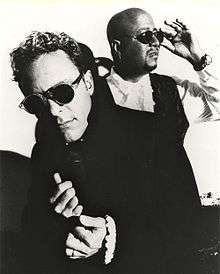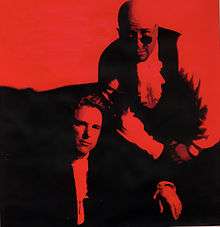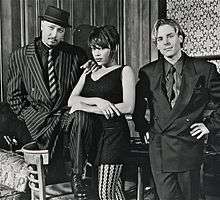Colour Club

Colour Club is an American jazz ensemble, which emerged in the mid-1990s, led by the duo of Skipper Wise and Les Pierce. A veteran producer of repute, Pierce had worked with Take 6, Herb Alpert, Patti LaBelle, and many others. Skipper had, through the 1980s and early 1990s, headed up the group known as Contemporary Jazz group Windows that delivered eleven albums over the course of a dozen years. Windows frequently featured players such as Peter White and Richard Elliot who were then rising commodities in the world of smooth jazz. Wise took a break from the music business in the late 90s to head up the award winning, high-end technology company Blue Microphones.
Together Wise and Pierce came up with the Colour Club[1] concept as a mix of smooth jazz with hip-hop rhythms, in the early 90s. They set aside a variety of individual projects and for their second and third albums they recruited vocalist Lisa Taylor along with host of guest jazz musicians such as Gary Meek and Rick Braun. Their self-titled debut[2] in 1994 featured the single Freedom Words with the video being nominated for an AMA (American Music Award.
History
In 1994, Skipper was introduced to Les Pierce who had a Top 40 hit at the time with the pop group “Louie Louie” and was producing the vocal group, “Take Six”. Skipper was signed to JVC Records for a three album deal along with Les Pierce as the group “Colour Club”
Colour Club, the self-titled album was released on the JVC label in early 1994 and reached number 5 on the NAC radio charts. The album was branded as the new movement in Europe called “Acid Jazz”
The video for the single “Freedom Words”[3] was shot in Zuma Beach, Malibu in Southern Calif and produced by Mitchel Linden. The results yielded a video of the year nominations from The American Billboards Video awards.
The album “In the Flow”[4] was released in 1996 on the JVC/VERTEX label. Now with a permanent singer Lisa Taylor, the album yielded three singles: “Be Yourself” which charted in the top 40 in Japan; “If it’s all Good”and “Pearls.”
The third and final Colour Club record, “Sexuality,” was released in 1997 on JVC/Vertex and the single “Tenderness” was issued. The accompanying video was released and six weeks later JVC America closed its doors. The album never got a chance.
Discography[5]



| Year | Album Details |
|---|---|
| 1994 | Colour Club
|
| 1994 | Freedom Words - Japanese Release
|
| 1994 | Freedom Words - Single
|
| 1994 | Trust Me - Single
|
| 1996 | In The Flow[6]
|
| 1996 | In The Flow Japanese Release
|
| 1996 | If It's All Good - Single
|
| 1996 | If It's All Good - Single
|
| 1996 | Pearls - Single
|
| 1997 | Sexuality
|
| 1997 | Tenderness - Single
|
Music Videos
References
- ↑ Billboard (1994-07-02). "The JVC Music". Billboard Magazine. Retrieved 2011-05-09.
- ↑ TheShyWriter. "Colour Club: Colour Club". The Shywriter.com. Retrieved 2011-05-10.
- ↑ Jazzlynx (2006-05-01). "Vintage Collection: Part One". Cafe Jazz Radio. Retrieved 2011-05-06.
- ↑ Billboard (1996-02-10). "Colour Club Focuses Its Palette". Billboard Magazine. Retrieved 2011-05-11.
- ↑ Billboard. "Colour Club: Albums". Billboard.com. Retrieved 2011-05-10.
- ↑ J.R. Reynolds (1996-06-15). "Benson's Back? 'That's Right'". Billboard Magazine. Retrieved 2011-05-10.
- ↑ Billboard. "Colour Club: Chart History". Billboard.com. Retrieved 2011-05-10.